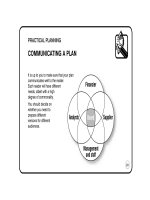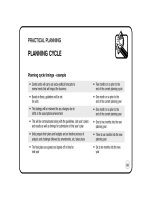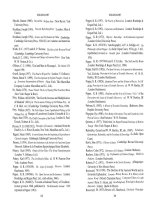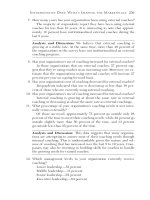Management pocketbooks the business planning pocketbook phần 10 potx
Bạn đang xem bản rút gọn của tài liệu. Xem và tải ngay bản đầy đủ của tài liệu tại đây (232.34 KB, 12 trang )
PRACTICAL PLANNING
PLANNING TOOLS & TECHNIQUES
GANTT CHART : EXAMPLE
97
ID
1
2
3
4
5
6
7
8
9
10
December January February
30/11 07/12 14/12 21/12 28/12 04/01 11/01 18/01 25/01 01/02 08/02 15/02
05/01/98 17:00
30/11/97 08:00
Milestone
Task Name Start
commence planning cycle 60d Sun 30/11/97
collect economic data 20d Mon 01/12/97
obtain final sign-off to last year’s budget 0d Sun 30/11/97
analyse 35d Fri 21/01/98
prepare assumptions for planning 25d Tue 02/12/97
obtain sign-off 0d Mon 05/01/98
circulate to managers 5d Tue 06/01/98
develop budget guidelines 25d Tue 02/12/97
send out to managers 5d Mon 16/02/98
develop corporate targets 35d Mon 29/12/97
Dur-
ation
PRACTICAL PLANNING
PLANNING TOOLS & TECHNIQUES
PERT ANALYSIS
PERT (which stands for Project Evaluation Resource Techniques) is another form of
planning which focuses on the tasks that must be carried out and the relationship
between them.
It shows dependencies and measures the critical path, ie: those tasks which must be
carried out to ensure that the end objectives are reached. It was developed for very
complex projects such as building submarines, etc, but can be used to provide a visual
representation of the relationships between a set of tasks in any plan. It gives
information by task such as task number, time to complete, which tasks precede and
which follow, as well as start and end dates.
It is particularly useful in that it identifies those tasks critical to success and enables you
to model what happens if they change.
(See diagram opposite)
98
PRACTICAL PLANNING
PLANNING TOOLS & TECHNIQUES
PERT CHART
99
obtain final sign-off
to last year’s budget
3 0 days
Sun 30/11/97 Sun 30/11/97
obtain sign-off
6 0 days
Mon 05/01/98 Mon 05/01/98
develop
corporate targets
10 35d
Mon 29/12/97 Fri 13/02/98
send out to managers
9 5 days
Mon 16/02/98 Fri 20/02/98
analyse
4 35 days
Fri 02/01/98 Thu 19/02/98
prepare assumptions
for planning
5 25 days
Tue 02/12/97 Mon 05/01/98
develop
budget guide-lines
8 25 days
Tue 02/12/97 Mon 05/01/98
circulate to managers
7 5 days
Tue 06/01/97 Mon 12/01/98
collect economic data
2 20 days
Mon 01/12/97 Fri 26/12/97
commence
planning cycle
1 60 days
Sun 30/11/97 Fri 20/02/98
PRACTICAL PLANNING
TIPS
When planning, there are a few key points to bear in mind:
● Don’t make the plan over-optimistic, especially with regard to sales; this
is very common
● Set realistic and achievable targets
● Don’t underestimate financing requirements, it is much harder to go back later on
and ask for more - it undermines credibility in your planning; you couldn’t get that
right, why should you be right about anything else?
● Think through your plan at a high level before committing to paper; the objectives,
key tasks, timings, resources, etc
● Write the summary last - it should be just that
● Make sure that your numbers add up and cross-cast; errors there undermine
credibility
● Don’t be afraid to change the plan if circumstances change radically, but also try
to plan for changes
100
PRACTICAL PLANNING
TIPS
● Start early - time disappears faster than you think
● Involve the right people - they will not buy-in if they have not been consulted
● Discuss it with affected parties prior to finalisation
● Be concise - remember KISS
● Make sure that it supports the overall plan
● Only analyse what is relevant (Pareto’s Law)
● Where data is unavailable, either commission research
(expensive) or make supportable assumptions
● State any assumptions in the introduction
● Put details in appendices
● Write with the ultimate reader in mind;
will he/she understand it
● Be realistic
● Get help where you need it
101
BUSINESS PLANNING
SUMMARY
A plan is a statement of what you intend to achieve, how, when and with what resources:
● It will contain targets against which to measure success
● It is a communication tool to interested parties
● It should focus on the key issues, with supporting detail as appropriate
● It should demonstrate forethought and contingency consideration
● It must be realistic, pragmatic and flexible
● It should support the strategy
102
NB
About the Author
Neil Russell-Jones MBA is a management consultant. He is
a chartered banker and a member of the Strategic Planning
Society. He has worked internationally with many
organisations, particularly in the areas of strategy, BPR,
change management and shareholder value. He is a guest
lecturer on the City University Business School’s Evening
MBA Programme and has lectured and spoken in many
countries. He is also an advisor for The Prince’s Trust. The
numerous articles and books written by him include three
other pocketbooks (on decision-making, marketing and
managing change), ‘Financial Services – 1992’ (Eurostudy)
and ‘Marketing for Success’ and ‘Value Pricing’,
both published by Kogan Page and written in conjunction
with Dr Tony Fletcher.
Contact: you can reach Neil on this e-mail:
Other Pocketbooks by the author include:
The Managing Change Pocketbook, The Decision-making Pocketbook
and The Marketing Pocketbook (illustrated).
Pocketbook titles in the Finance Series are:
The Balance Sheet Pocketbook (illustrated), The Managing Cashflow Pocketbook,
The Managing Budgets Pocketbook and The Improving Profitability Pocketbook.
THE MANAGEMENT POCKETBOOK SERIES
Pocketbooks
Appraisals Pocketbook
Assertiveness Pocketbook
Balance Sheet Pocketbook
Business Planning Pocketbook
Business Presenter’s Pocketbook
Business Writing Pocketbook
Challengers Pocketbook
Coaching Pocketbook
Communicator’s Pocketbook
Creative Manager’s Pocketbook
Cross-cultural Business Pocketbook
Cultural Gaffes Pocketbook
Customer Service Pocketbook
Decision-making Pocketbook
Empowerment Pocketbook
Export Pocketbook
Facilitator’s Pocketbook
Improving Efficiency Pocketbook
Improving Profitability Pocketbook
Influencing Pocketbook
Interviewer’s Pocketbook
Key Account Manager’s Pocketbook
Learner’s Pocketbook
Managing Budgets Pocketbook
Managing Cashflow Pocketbook
Managing Change Pocketbook
Managing Your Appraisal Pocketbook
Manager’s Pocketbook
Manager’s Training Pocketbook
Marketing Pocketbook
Meetings Pocketbook
Mentoring Pocketbook
Motivation Pocketbook
Negotiator’s Pocketbook
Networking Pocketbook
People Manager’s Pocketbook
Performance Management Pocketbook
Personal Success Pocketbook
Project Management Pocketbook
Problem Behaviour Pocketbook
Quality Pocketbook
Sales Excellence Pocketbook
Salesperson’s Pocketbook
Self-managed Development Pocketbook
Stress Pocketbook
Teamworking Pocketbook
Telephone Skills Pocketbook
Telesales Pocketbook
Thinker’s Pocketbook
Time Management Pocketbook
Trainer Standards Pocketbook
Trainer’s Pocketbook
Pocketfiles/Other
Leadership: Sharing The Passion
The Great Presentation Scandal
Hook Your Audience
Trainer’s Blue Pocketfile of
Ready-to-use Exercises
Trainer’s Green Pocketfile of
Ready-to-use Exercises
Trainer’s Red Pocketfile of
Ready-to-use Exercises
Audio Cassettes
Tips for Presenters
Tips for Trainers
Please send me:
The
Business Planning
Pocketbook
The Pocketbook
The Pocketbook
The Pocketbook
The Pocketbook
Your details
Name
Position
Company
Address
Telephone
Facsimile
VAT No. (EC companies)
Your Order Ref
ORDER FORM
No.
copies
Order by Post
MANAGEMENT POCKETBOOKS LTD
14 EAST STREET ALRESFORD HAMPSHIRE SO24 9EE UK
Order by Phone, Fax or Internet
Telephone: +44 (0)1962 735573
Facsimile: +44 (0)1962 733637
E-mail:
Web: www.pocketbook.co.uk
Customers in USA should contact:
Stylus Publishing, LLC
22883 Quicksilver Drive, Sterling, VA 20166-2012
Telephone: 703 661 1581 or 800 232 0223
Facsimile: 703 661 1501 E-mail:









